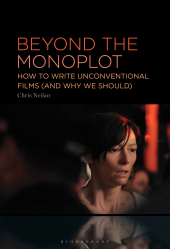Beyond the Monoplot : How to Write Unconventional Films (and Why We Should)
288 p.
This book provides a toolkit for unconventional practice-a comprehensive list of unconventional story shapes and the meanings they create, with accompanying case studies, including: one-act structure; two-act structure; passive protagonists; untimely death of the protagonist, and more.Formed from Aristotelian principles and a three-act shape brought to Hollywood by Broadway playwrights after the advent of sync sound, Conventional Monoplot has come to dominate screen storytelling practice throughout the Western world. For the experimental, rule-suspicious, unconventional screenwriter, alternative storytelling models are available. Beyond the Monoplot offers screenwriters and screenwriting students a new way of approaching and quantifying conventional practice, whilst equipping them with the skills and tools to subvert convention and expectation in dynamic and innovative ways. Where the revolutionary New Hollywood period of the '60s and '70s saw strikingly iconoclastic, original, rule-breaking narratives attrac
ting enormous audiences and making indelible cultural imprints, today's most widely seen films stick rigidly to the Conventional Monoplot model. Shaped and solidified by best-selling screenwriting handbooks of the '80s and 90s, this model proved incredibly useful for a rapidly industrialising consumerist approach to screen entertainment, pushing unconventional and innovative storytelling practices to the cultural fringe. Whilst bold, daring films are still made, their impact is muted: Moonlight, despite winning Best Picture, was only the 92nd highest grossing film of its year. And whilst great strides are made towards diversity and representation, story shapes remain cloistered within a consumerist and highly conventionalised form, against which this book pushes back. [Publisher's text].
Special access authorizations may apply; please contact us for further information.
-
Informazioni
ISBN: 9798765107560


